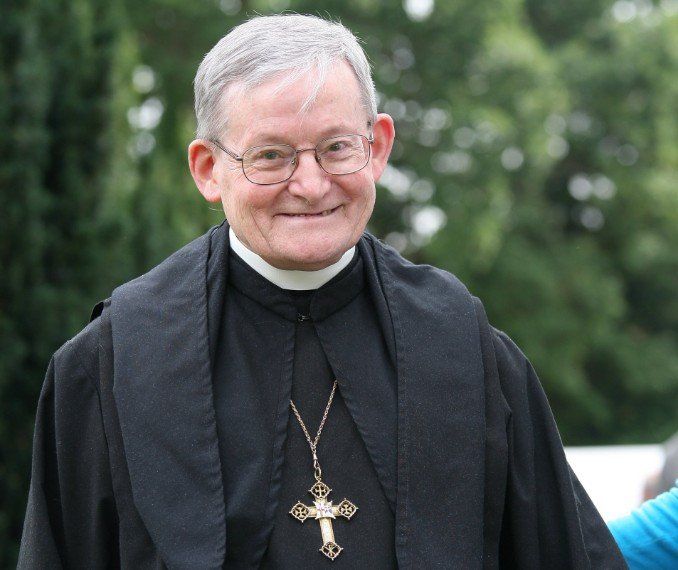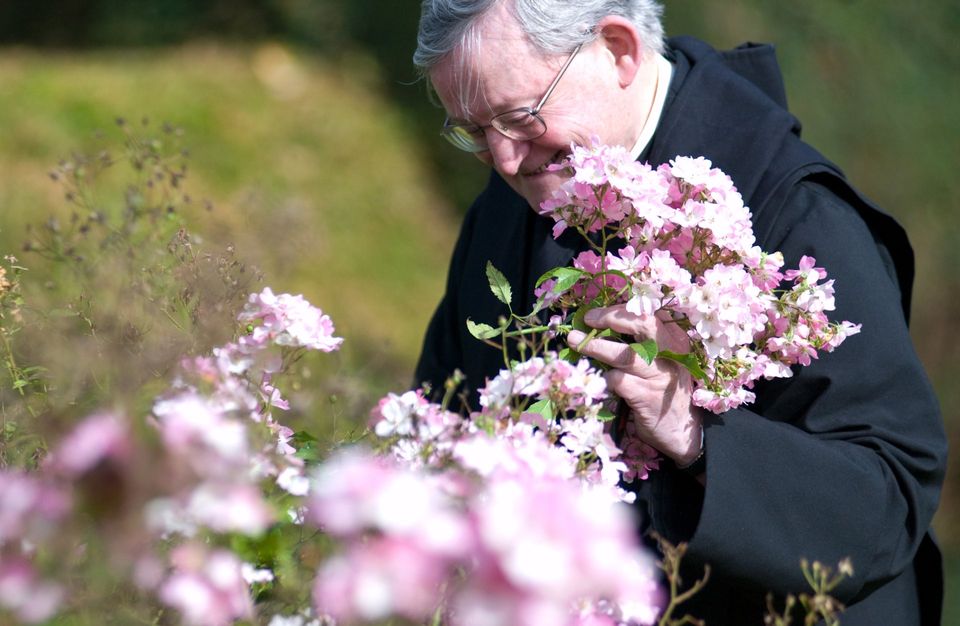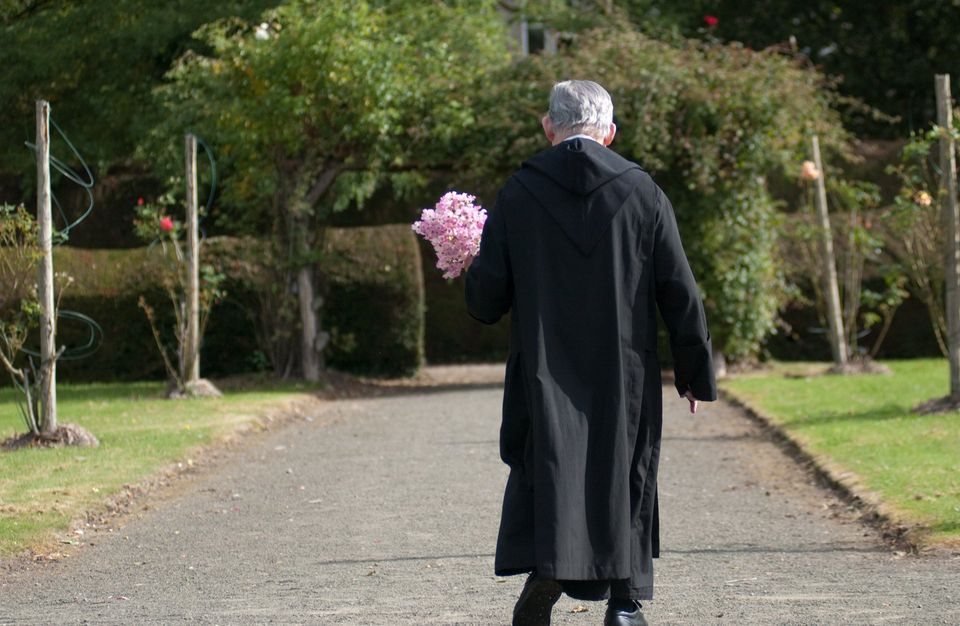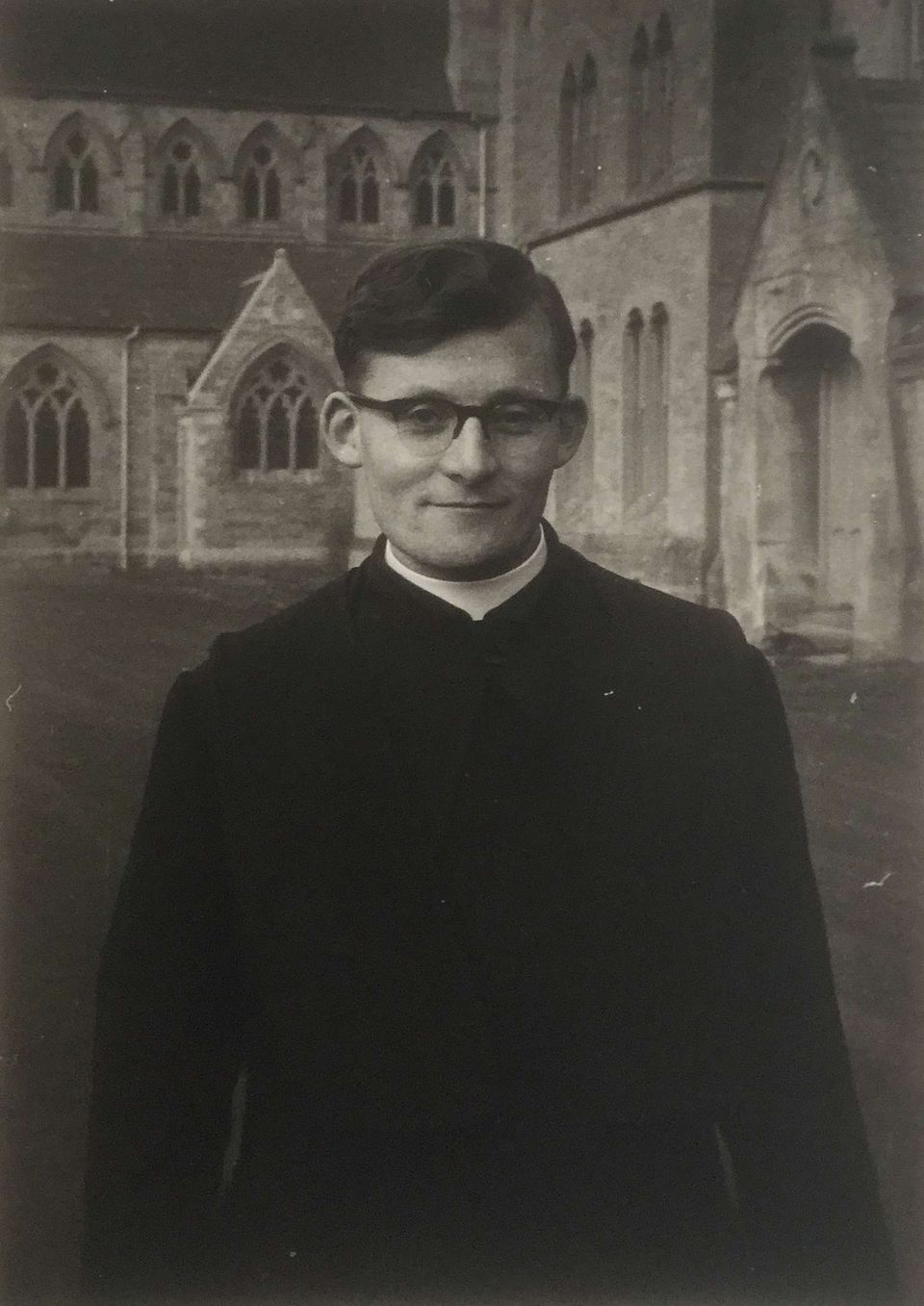Abbot Jerome Hodkinson
Abbot Jerome was the eighth abbot of Belmont and served for 16 years from 1970 to 1986. He was known for his love of the Gospels as well as poetry and English literature. Abbot Paul says he was "undemanding, always grateful and infinitely kind, gentle and polite." He died on 12th June 2016.
Abbot Jerome hated long sermons. He’d say, "What can't be said in five minutes, isn't worth saying." I hope he'll forgive me this afternoon.
Today, in the Benedictine Calendar, we celebrate the feast of Saints Martha, Mary and Lazarus, the friends of Jesus, so the Gospel passage we heard just now is most appropriate. It was one of Fr Jerome's favourites. Lazarus has been dead four days and Jesus has arrived at Bethany to sympathize with his sisters. Jesus, we are told, loved Lazarus. From St Luke's Gospel, we also discover that he loved his sisters, poor Martha, who complained that she had so much to do, and Mary, who sat in silence at the feet of Jesus, she who had "chosen the better part." However, today it’s Martha, who first confesses, "I believe that you are the Christ, the Son of God, the one who was to come into this world." Later, Mary will repeat the same words, while Lazarus will be called by Jesus to come out of the tomb, becoming living proof that Jesus is truly "the resurrection and the life." Abbot Jerome was a man of simple faith, who was often heard to say, "Why can't we just believe what Jesus said and do what he asked of us?" He believed without questioning in the word of Jesus.
You might be wondering how the second reading from St Paul's Letter to the Romans came to be chosen for this Requiem Mass; it's not one of the usual readings. On the night Fr Jerome died, we were all taken by surprise at the speed with which he left us. The only prayer book available in the hospital ward was the Roman Office on my mobile phone, so we said Vespers. Fr Jerome had always loved the ferial office and didn't much care for feast days. He didn't like all the fuss. As it turned out, the reading for that day, 12th July, was from Romans 12 and it seemed to sum up his life, his vocation, his ministry and his faith. What other reading could be more appropriate today? "Do not let your love be a pretence... Love each other as brothers should... Work for the Lord with untiring effort... Hope will make you cheerful... Do not give up when trials come... Keep on praying... If anyone is in need, share with them... Make hospitality your special care... Bless and do not curse... Rejoice with those who rejoice, weep with those who weep... Treat everyone with equal kindness... Do not claim to be wiser than you are." You can hear him say, "That's the way we should live."
James Anthony Hodkinson was born at Colwyn Bay on 28th March 1929, the third of four sons born to Stephen and Jane Hodkinson. Although he never learnt Welsh himself, he was proud of the fact that his father, originally from Lancashire, was a fluent Welsh speaker. He was educated at St Joseph's Primary School, Colwyn Bay Grammar School and with the Oblates of Mary Immaculate at St Mary's College. In 1945 he took the School Certificate and passed the Civil Service examination. He received an appointment, but decided instead to try his vocation at Belmont, where he arrived on 18th September 1946. He was clothed on Christmas Eve by Abbot Aidan Williams and made his first Profession at Midnight Mass on 25th December 1947. That same year he was called up for National Service, which was deferred pending a chest examination. He made his Solemn Profession under Abbot Anselm Lightbound on 29th December 1950. His priestly formation was all done at Belmont, as was often the case then, and in October 1949 he went up to Oxford to read English. He graduated in June 1952. In July 1953 he was ordained a Subdeacon and in April 1954 a Deacon by Archbishop Michael McGrath of Cardiff. Then, on 3rd July 1955, together with Fr Stephen, he was ordained a priest. It couldn’t have been easy trying to study Philosophy and Theology while, at the same time, taking a degree at Oxford and teaching in the school, but that was how it was done and you were expected to cope.
Fr Jerome's teaching career spanned 43 years, from September 1952 to June 1994. He began by teaching English and Scripture, was put in charge of Cricket, which he adored, and also taught French, Latin, Chemistry and helped with theatricals. From 1953 to 1955 he was school choirmaster. For many years Fr Jerome was a first cantor, ruining his voice by singing the high notes of Gregorian chant when he was naturally a bass-baritone. In 1957 he was appointed Phillipps Librarian, in 1958 Infirmarian and in 1959 Coach to the 2nd XV. If Cricket was his first love, then Rugby came a close second and these remained with him to the end. His small stature and youthful good looks gave rise to the nickname “Teddy Bear” and the boys would sing Elvis Presley’s song when he walked into the room. In 1960 he was appointed Junior Master in the monastery by Abbot Maurice Martin and, in his own words, "having given up cricket, rugby, etc., I took to working in the woods and learning Chinese." Nevertheless, from 1962 to 1965 he taught Classics and in September 1965 became Head of English. He dedicated himself to teaching “A level” English to the delight of his students, instilling in them a lasting love for the great English poets, in particular the Bard himself and Gerard Manley Hopkins and, of course, for the greatest novelist who ever lived, Jane Austen.
In 1966 he was elected Delegate to General Chapter and appointed Prior by Abbot Robert Richardson. This was a particularly difficult time for Belmont, what with adapting to the changes in monastic life encouraged by the Second Vatican Council and the financial crisis affecting Belmont because of excessive investment in the school. There was an Extraordinary Visitation and, in October 1969, Fr Jerome was appointed Bursar in an attempt to bring things under control. Tragically, Abbot Robert was diagnosed with cancer and died on 25th October 1970, the day on which the Forty Martyrs were canonised. An abbatial election was held and, on 18th November, Fr Jerome was elected 8th Abbot of Belmont, a position he held until July 1986, when Abbot Alan Rees was elected. Abbot Jerome continued to work as Bursar until June 1971, when he was replaced by Fr Luke Waring and, a year or so later, Major Leo Oddie, our first lay bursar.
To begin with Abbot Jerome didn’t take to liturgical innovation and wouldn’t concelebrate at the daily Conventual Mass, preferring to say a private Latin Mass, albeit in the new rite. He asked Br Alan and me to work together on a revised English Office: I worked on the texts, while Alan composed the music. It’s essentially the Office we still use today. The interior of the beautiful abbey church had been torn apart in 1967, to seat more people and so that Mass could be celebrated "facing the people." It was a shambles: the high altar had been destroyed and replaced by a concrete wall, gone were St David's Chapel and the magnificent choir screen. The altar was a refectory table resting on orange boxes. Abbot Jerome decided that something had to be done, if not to restore what was lost, at least to make a decent job of what was left. This was done in 1978 and the result is what we have today. Abbot Jerome often said, "I did the best of a bad job," a rather harsh judgment on himself. Although at times he could appear to be proud, even pompous as some thought, he was in fact a realist and preferred to call himself a cynic. He enjoyed reading and loved the sound of his own voice, practising his homilies before a mirror until they were perfect.
He was an able teacher, but no great lover of our schools. He did, however, encourage the monks who dedicated themselves to running them, as he did those who worked on the many parishes Belmont served at that time. He wasn't keen on travel and would rather stay at home than go anywhere: any visit was sure to be short. He preferred to drive up to Whitehaven, a journey of six hours, and return as soon as the Mass or other function was over. He hated going to Rome for the Abbots' Congress and never took a proper holiday. He felt more at home in his cell and choir stall or on the squash court. Nevertheless, he did find time for outside engagements. He enjoyed regular discussions with his doctor-clergy group and was always in demand as an after dinner speaker, such was his store of jokes and stories. He had a phenomenal memory and was a good mimic. He took part in ecumenical activities and celebrated Pontifical High Mass in Hereford Cathedral for the Sesquimillennium of the Birth of St Benedict, at which Dean Rathbone of Hereford preached.
Long before the phrase "common good" came into fashion, Abbot Jerome believed that ecumenism should extend beyond the narrow confines of pew and pulpit for the good of society. He was instrumental in founding the Samaritans in Hereford and, later on, St Michael's Hospice. My generation of novices was encouraged (or was it obliged?) to train and work as Samaritans. He had a deep concern for those in need and tried to instill that concern in others. At Belmont he founded St Luke's, an infirmary for sick monks, and it was his particular sorrow, later in life, that this had been dismantled after the closure of the school to make way for a shop and then a bar. "So much for Benedictine stability," he would say. He had a rare gift for listening to those in trouble or in pain without feeling the need to find easy answers. He knew that healing comes about through listening and allowing the other to speak. You could tell Fr Jerome anything: nothing shocked or scandalised him, nothing could destroy his peace and that peace helped calm an anxious soul. He developed, without wanting to, an extraordinary ministry to people all over the country and much further afield. Christ’s compassion moved his heart and guided his life and in it others found hope.
The Lord works in mysterious ways: who could have imagined that Abbot Jerome would found a monastery in Peru? It came as a great surprise to everyone, when in 1979, influenced by Mother Mary Xavier McGonagle of Tyburn, he responded positively to the invitation of the Archbishop of Piura, Mgr Fernando Vargas S.J., for Belmont to make a foundation. "Go out and see what this joker wants," was what he said. In 1980 he went out himself and by May 1981 Frs Luke, David and I were in Bolivia learning Spanish. On 6th August, Abbot Jerome joined us in Lima and on 20th, feast of St Bernard, we inaugurated our foundation in the parish house at Tambogrande. Here we worked together with a joint community of Sisters of Notre Dame and Sisters of St Joseph of the Apparition, as well as with a great team of lay catechists and others. Fr Jerome was bowled over by the simplicity, intelligence and faith of the Peruvian people and was deeply moved by the abject poverty in which many of them lived. On one occasion, making our way to a distant village in the foothills of the Andes, we were stopped at a hamlet called Las Monicas by a young farmhand, whose wife had just given birth prematurely. We stepped inside their hut and I suggested that he baptize the baby and anoint the mother. He did so with the utmost dignity and tenderness. Later on, in tears, he told me that he had never baptized a baby before. Unfortunately, as often happened in rural areas, both mother and baby were taken by the Lord to their heavenly reward. For Abbot Jerome it was an encounter with Christ that he never forgot.
In 1986, no longer abbot, he did ’t move away, but continued teaching in the school and took pastoral care of Broad Oak and Llanarth. In 1989 he became Parish Priest of Bromyard and in 1992 of Belmont. This was a new departure for him. He enjoyed the contact with parishioners but not the bureaucracy of parish administration. In 1994 he more or less retired except for a few retreats and became monastery archivist, having served for a year as Prior to Abbot Mark. "I retired to a life of idleness,” he wrote, his way of translating the monastic term "otium," when the monk gives himself wholly to God. In many ways, the last 22 years of his life became the most fruitful, for he was able to dedicate himself to reading and prayer and to the spiritual direction of many souls, most of them women. Fr Jerome always said that men don’t understand women, and he was right, we don't, but somehow he did. Was it his knowledge of Jane Austen, the close relationship he had had with his mother, his love for Our Lady or a gift from God to a very special man? Perhaps, it was all these, for Fr Jerome was profoundly aware of the "givenness" of God's gifts. Following the mediaeval Mystics and of Abbot John Chapman, he helped us see that prayer, like faith, is God's gift and that our calling is like that of Mary of Bethany, to sit at the feet of Jesus in quiet anticipation of his word and the outpouring of grace. He had the ability to put you at ease and simply listen, for as long as you needed, and then keep quiet and allow God to work. There were those who did not understand or appreciate this ministry, but the number of letters and cards we have received since his death speak eloquently of the immense help and friendship he gave to so many people, including priests and religious. He was remarkably humble and self-effacing and never wished to draw attention to himself. He served, for example, as chaplain to the Mother Teresa Group for seven years. And he was always jovial and welcoming
The onset of his debilitating illness was painful and difficult for him to accept: the man who had been so agile in his youth, a fine sportsman, now found himself unable to walk or even wash. To begin with, there were times when he appeared impatient and angry, but the move to the infirmary and the help of carers enabled him to be more comfortable and so dedicate time to his telephone ministry. For the last four years of his life he retired to his room, not wishing to leave it even for Mass. At long last he was able to live the eremitical life for which he had always longed. Mercifully, the end came very quickly, just a month after the death of Fr Luke, his fellow novice and friend. He was undemanding, always grateful and infinitely kind, gentle and polite. When you visited or rang him, her never spoke about himself, but always wanted to know how you were and what you'd been up to. He was focused on Christ and was already looking into eternity. He had become, like the Windhover in Gerard Manley Hopkins' poem:
May Christ, the Resurrection and the Life, grant him eternal rest. May he soar like to heaven like the falcon. Amen.













